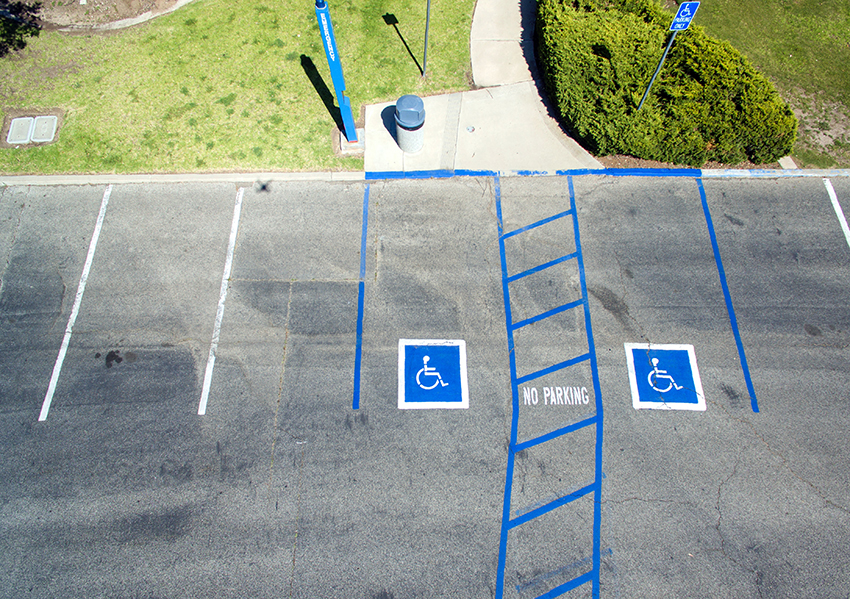
About 15 million Americans have some form of disability. The Americans with Disabilities Act (ADA) applies to virtually all types of businesses. Title III of the ADA states that businesses cannot discriminate against customers on the basis of disability. More specifically, it requires businesses that serve the public to remove barriers from older buildings and to design and build new facilities to provide access to customers with disabilities. One major component of ADA compliance is that businesses must provide accessible parking spaces for the disabled in accordance with federal and state laws.
Under the ADA, in order for an accessible parking space to be usable, all elements of the space must be free of obstructions which may include: the vehicle space, the access aisle, the curb ramp, and the route that connects the parking to the accessible entrance of the building. Accessible spaces must be at least 8 feet wide and include a 5-foot-wide access aisle alongside each one. Lack of maintenance of any one of these elements can make the whole space inaccessible. To maintain compliance, businesses should remove obstacles, such as shopping carts, maintenance equipment, and cars without designated license plates or placards, from parking spaces and access aisles as soon as possible.
Many state and local governments have their own requirements, which may be more specific or more stringent. In New Jersey, accessible parking requirements are a combination of New Jersey Statutes and ADA Standards for Accessible Design. For example, owners or operators of any facility (e.g., restaurant, theater, library) which provides public parking, whether an indoor or outdoor garage or parking lot, are required to provide accessible parking spaces in accordance with federal and state laws. Enforcement of motor vehicle laws, including parking privileges, is a local matter. To enforce parking rules municipalities may set up parking enforcement units that concentrate on shopping centers and malls.
Like the ADA standard, in New Jersey, access to parking spaces, curb cuts, or other improvements designed to provide accessibility, shall be unobstructed. Owners or controllers of public parking areas must remove snow or ice from these areas within 24 hours after the weather condition causing the snow and/or ice ceases. Violation of this act is punishable with penalties of $500 to $1,000. Signage also should include a penalty sign indicating fines for offenses. The penalty for the first offense is $250 and, for subsequent offenses, a $250 minimum fine and/or up to 90 days community service.
Also, similar to the ADA, New Jersey requires that the number of accessible parking spaces required depends on the total number of parking spaces in the lot or garage. New Jersey law requires that there be one space for every 25 total spaces up to 100 spaces. After 100 spaces, the ratio decreases in favor of non-accessible parking spaces. Small parking lots of four or fewer spaces must have accessible spaces, but those spaces do not need a sign and anyone, with or without a disability, can park in the accessible space. This is intended so very small entities do not have to reserve 25% to 100% of their available parking for individuals with disabilities.
The New Jersey Barrier Free Subcode and the 2010 Americans with Disabilities Act requires that accessible car parking spaces be at least 96 inches (8 feet) wide and accessible van parking spaces be at least 132 inches wide (11 feet). The access aisle for both accessible car and van spaces is required to be a minimum of 60 inches (5 feet) wide. Van Parking spaces, however, are permitted to be a minimum of 96 inches (8 feet) wide where the access aisle is a minimum of 96 inches (8 feet) wide.
In addition, businesses must completely remove snow, ice, mud, and leaves from accessible parking spaces whenever plowing or clearing the rest of the parking area. They must be sure that cleaning crews do not pile snow or gravel in the accessible parking spaces, access aisles, and curb ramps. Businesses must maintain curb ramps and sidewalks to prevent large cracks and uneven surfaces from forming and keep the accessible route from the parking area to the store’s entrance clear of obstacles that either block or narrow the route.
It is important for businesses to ensure that they are compliant with the ADA requirements regarding parking and accessibility. Places such as New York City have recently seen an increase in the number of lawsuits filed because of discrimination of individuals with disabilities. Some cases involve very minor violations of the law even though it is clear that the business has put forward a good faith effort to fully comply with the law. In many others, the Plaintiff recovers only a small amount while being charged exorbitant legal fees.
To help ensure ADA compliance regarding handicap parking, companies should have written policies on job accommodations, remove physical barriers to existing structures when readily achievable (without much difficulty or expense), and make any minor adjustments to standard operating procedure when necessary.
Sadayah Q. DuRant-Brown, Esq. is an attorney and recent graduate of Rutgers School of Law, where she was Editor of the Race and The Law Review Journal.

